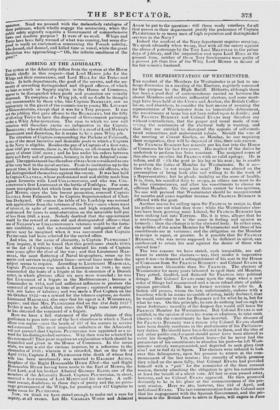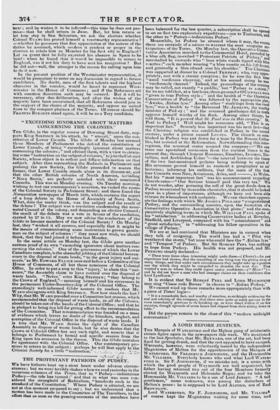THE REPRESENTATION OF WESTMINSTER.
THE conduct of the Members for Westminster is at last to un- dergo discussion in a meeting of the Electors, regularly convened for the purpose by the High Bailiff. Hitherto, although there has been a good deal of correspondence carrieti on between the absent Members and certain influential electors, and some meet- ings have been held at the Crown and Anchor, the British Coffee- (mese, and elsewhere, to consider the best means of rescuing the representation of Westminster from its lamentable debasement. the constituency at large has not been called upon to decide ; and Sir Fesecis Bueourr and Colonel EVANS may therefore say without contradiction, that the proper and usual mode of con- v, i mg the sentiments of the electoral body is wanting, and that they are entitled to disregard the appeals of self-consti- tuted committees and maleeontent cabals. Should the vote of the meeting at Covent Garden, on Monday, be one requiring their resignation, they will be deprived of this, their sole excuse. Sir FRANCIS BURDETT has scarcely put his foot into the House of Commons for the last two years. His neglect of the duties he undertook to perform leis been constant. The assigned cause of this absence supplies Sir FRANCIS with no valid apology. Ile is infirm, and ill v. ith the gout in his leg or his arm ; he is unable to perform the duties of Member for Westminster. Be it so— then why does he not resign his seat? Ile was elected on the presumption of being both able and willing to do the work of a Representative; but he pleads inability on the score of health. It is, then, his manifest duty to resign, as others are wont to do in. like circumstances, and allow his constituents to choose an efficient Member. On this point there cannot be two opinions. No one will pretend that Westminster should be unrepresented for months and years together because Sir FRANCIS Beans= is uffiicted with the gout.
Another reason for calling upon Sir FRANCIS to resign is, that his politics are not what they were: while the Westminster elec- tors have been growing more Liberal, Sir FRANCIS BURDETT has been sinking fast into Toryism. He, it is true, alleges that he is unchanged—that be is the same in feeling and opinion as formerly : then the change is in the electoral body. In either case, the politics of the senior Member for Westminster and those of his constituents are at variance; and the obligation on the Member to resign is equal, or greater. Is it possible that Sir Fesects Bullpen., who was never supposed to be deficient in spirit, can condescend to retain his seat against the desire of those who elected him ?
The two reasons we have stated, each irresistible, are suf- ficient to entitle the electors — nay, they render it imperative upon tItem—to demand a relinquishment of his seat in the House Of Commons from Sir FRANCIS BURDETT : and Colonel EVANS is perhaps more blameable than Sir FRANCIS. The electors of Westminster for many years laboured to speil their old Member. They petted, dandled, and flattered Sir FRANCIS into political dotage. But Colonel EVANS came upon the stage when a new order of things had commenced and a more robust state of public opinion prevailed. He has no former services to refer to. A foolish old person, whom the law, unfortunately, endows with a franchise which he seems incapable of using, lately declared, that he would continue to vote for BURDETT not for what he is, but for what lie was. On this principle, he can do nothing bad enough to incur forfeiture: rascality of the deepest dye would still leave Sir FRANCIS Member for Westminster. But Colonel EVANS is not entitled, in the opinion of even his warmest admirers, to take such liberties with the constituency he has deserted. The absence of Sir FRANCIS BURDETT was a reason why Colonel EVANS should have been doubly assiduous in the performance of his Parliamen- tary duties. He should have hull devoted to them, and the Idea of any other public employment should never have been allowed to enter his thought. Yet, without leave—for he never had the permission of his constituents to abandon his post—he left West- minster entirely unrepresented, and departed to seek glory (but alas ! not to find it) in Spain. The electors were induced to look over this delinquency, upon his promise to return at the COM- mencernent of the last session ; the sincerity of which promise they relied on the more fully, that Colonel EVANS had provided himself with a "pair' for the remainder of the then current session, thereby admitting the obligation to give his constituents at least the benefit of a silent vote. All last session passed away, however, and no Colonel EVANS appeared. Ile then promised distinctly to be in his place at the commencement of the pre- sent session. Here we are, however, this 2.2d of April, and no Colonel EVANS. Tile last communication from the Colonel says that his engagement with the Spanish Government, and the per- mission to the British force to serve in Spain, wail expire an June next ; and he wishes it to be inferred—this time he does not pro- mise—that be shall return in June. But, let him return or let him stay in San Sebastian, we ask the electors whether Colonel EVANS has proved himself a trustworthy representative ? —whether he possesses that due appreciation of the nature of the duties he assumed, which renders it prudent or proper in the electors to retain him as Member for the first city in England? Let us grant that he fully expected his absence in Spain to be brief : when he found that it would be impossible to return to England, was it not his duty to have sent his resignation ? But he did not—well, the stronger is the reason for calling upon him to do it now.
In the present position of the Westminster representation, it would be premature to enter on any discussion in regard to future candidates. No doubt, men of the first talents and the highest character in the country, would be found to represent West- minster in the House of Commons; and if the Reformers act with common discretion such may be secured. But it will be necessary, after due deliberation, and after the wishes of the rnajorits have been ascertained, that all Reformers should join in the support of the choice of the majority, and oppose an united force to the compact phalanx of the Tories. Of course should Sir FRANCIS Beepers stand again, it will be as a Tory candidate.



























 Previous page
Previous page